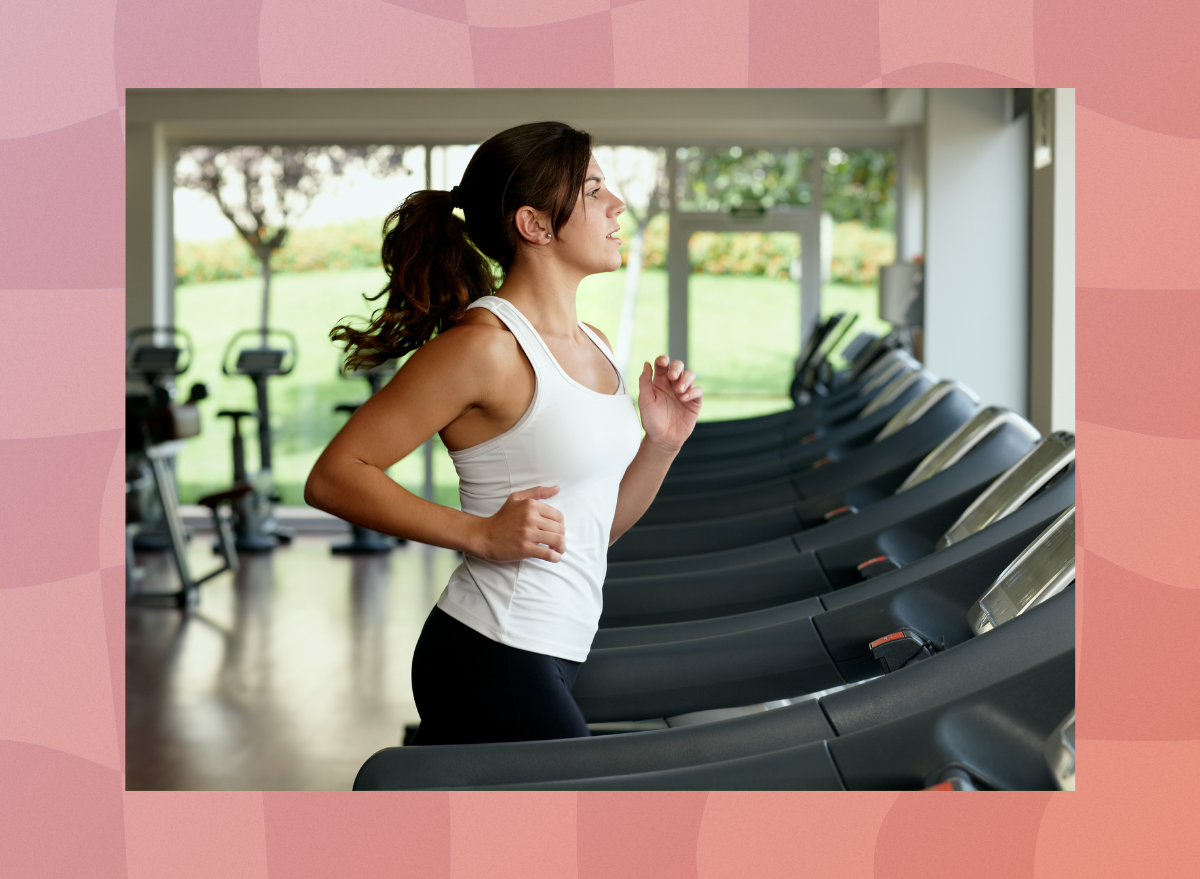Treadmill or Elliptical: Which is More Effective for Weight Loss?

You've set your sights on shedding those extra pounds and revving up your metabolism to maximize calorie burn. With your strength training regimen already mapped out, the next hurdle to tackle is deciding on the optimal cardio machine for your sweat sessions. As you step into the gym, you're likely faced with the classic dilemma: treadmill or elliptical—which is more effective for weight loss? These two stalwarts of the gym offer distinct advantages and workout styles, each contributing to your weight loss journey in its own way.
In this breakdown, I've meticulously examined the efficacy of both treadmills and elliptical machines for weight loss, delving into the unique benefits of treadmill workouts and the advantages of elliptical training. Keep reading to learn more, and when you're finished, be sure to check out Here's How Long You Need To Walk Every Day for Weight Loss.
Which is more effective for weight loss, the treadmill or elliptical?

On the one hand, with options for walking, jogging, running, and incline training, treadmills offer versatility in workout intensity and variation. Running or jogging on a treadmill typically burns more calories per hour than elliptical workouts due to higher intensity workouts and the engagement of multiple muscle groups. You can even toss on a weighted vest to increase the intensity further for walking, jogging, or incline-based sessions. One consideration—especially if you have a history of subpar joint health—is that treadmills are higher-impact as your feet repeatedly hitting the surface and not being as forgiving as soft ground.
On the other hand, elliptical machines offer a low-impact workout, making them ideal for individuals with joint issues or those recovering from injuries. The elliptical's smooth, gliding motion reduces joint stress while still providing an effective cardiovascular workout. Ellipticals simultaneously engage both the upper and lower body, targeting various muscle groups such as the arms, legs, and core. While they may burn fewer calories per hour than treadmills, ellipticals offer a significant cardiovascular challenge and can contribute to weight loss goals.
Now, let's address the dilemma: treadmill or elliptical—which is more effective for weight loss? If you're looking to slim down, the most effective machine is ultimately the one you enjoy using consistently. While treadmills may have an edge in calorie burning due to their higher-intensity workouts, ellipticals provide a comfortable and versatile option, especially for those who prefer low-impact exercises. Incorporating variety into your routine by alternating between the treadmill, elliptical, and other forms of exercise can help prevent boredom and keep your workouts effective for achieving weight-loss goals.
The benefits of working out on a treadmill:

Treadmill workouts offer numerous benefits for improving cardiovascular health, burning calories, and enhancing overall fitness. One key advantage is the versatility treadmills provide. Treadmills allow users to customize their workouts by adjusting speed, incline, and duration, making them suitable for individuals of all fitness levels. Whether you prefer walking, jogging, running, or incline training, a treadmill can accommodate various workout intensities and goals.
Another benefit of treadmill workouts is their effectiveness in burning calories. Running or jogging on a treadmill engages multiple muscle groups and elevates heart rate, significantly increasing calorie expenditure. Additionally, adjusting speed and incline allows users to create high-intensity interval training (HIIT) routines, maximizing calorie burn and boosting metabolism during and after the workout.
Treadmill workouts provide benefits for cardiovascular health and overall fitness. Regular aerobic exercise on a treadmill can help improve heart and lung function, lower blood pressure, and reduce the risk of chronic diseases. Moreover, treadmill workouts strengthen muscles, bones, and joints, improving overall physical health and longevity.
If you're looking to crush your weight-loss goals on the treadmill, consider a few of these awesome workouts below:
Interval Training:
Alternate between periods of high-intensity sprinting and recovery periods of walking or jogging. For example, sprint at maximum effort for 30 seconds, then recover by walking or jogging for one to two minutes. Repeat this cycle for 20 to 30 minutes.
Incline Intervals:
Increase the incline on the treadmill to simulate hill climbing. Start with a moderate incline and walk or jog for one to two minutes, then increase the incline to a challenging level and maintain a brisk pace for one to two minutes. Continue alternating between moderate and high inclines for 20 to 30 minutes.
Pyramid Workout:
Begin with a five-minute warm-up at a comfortable pace. Then, increase the speed every minute for five minutes, reaching your maximum sustainable speed. Maintain this speed for one to two minutes, then gradually decrease the speed every minute for five minutes. Finish with a five-minute cooldown at a comfortable pace.
Long-Distance Run:
Set a goal distance (e.g., 3 miles) and maintain a steady pace throughout the workout. Start with a five-minute warm-up, then run at a consistent pace for the specified distance. If needed, take short walking breaks to recover, but aim to complete the distance without stopping.
Hill Repeats:
Increase the incline to a challenging level, and run or walk uphill for a set duration (e.g., one minute). Recover by reducing the incline and jogging or walking downhill for the same duration. Repeat this cycle for 20 to 30 minutes, adjusting the speed and incline as needed.
The benefits of working out on an elliptical:

Working out on an elliptical offers a range of benefits for improving cardiovascular fitness, burning calories, and enhancing overall health. One significant advantage is the low-impact nature of elliptical workouts. The smooth, gliding motion reduces stress on the joints, making it an ideal exercise option for individuals with joint pain, arthritis, or those recovering from injuries. Unlike running or jogging, which can strain the knees, ankles, and hips, elliptical training provides a gentle yet effective way to get the heart pumping without risking injury.
Another benefit of working out on an elliptical is its ability to provide a full-body workout. Elliptical machines engage the upper and lower body, targeting various muscle groups such as the arms, legs, glutes, and core. Users can sculpt and strengthen muscles throughout the body by incorporating both pushing and pulling motions with the handles while improving coordination and balance. Additionally, many elliptical machines offer adjustable resistance levels, allowing users to increase the intensity of their workouts and continue challenging themselves as they progress.
Elliptical workouts are also highly effective for burning calories and improving cardiovascular health. The continuous, rhythmic motion of elliptical training elevates heart rate, increases oxygen consumption, and stimulates fat burning. Depending on factors such as intensity, duration, and body weight, individuals can burn many calories during each session, making elliptical workouts an efficient option for weight loss and calorie management. Regular aerobic exercise on an elliptical can also help improve heart and lung function, lower blood pressure, and reduce the risk of chronic diseases such as heart disease, stroke, and diabetes.
Here are a few workouts that are sure to ignite your metabolism with effective elliptical workouts:
Interval Training:
Alternate between periods of high-intensity effort and recovery. For example, pedal at a moderate pace for two minutes, then increase the resistance and pedal at maximum effort for one minute. Repeat this cycle for 20 to 30 minutes.
Reverse Pedaling:
Pedal in reverse engages different muscle groups and adds variety to your workout. Start with a moderate resistance level, and pedal backward for three to five minutes, then switch to forward pedaling for three to five minutes. Continue alternating between forward and reverse pedaling for the duration of your workout.
Hill Climbing:
Increase the resistance level to simulate climbing uphill. Begin with a moderate resistance, and pedal at a steady pace for five minutes. Then, gradually increase the resistance every minute until you reach a challenging level. Maintain this resistance for five to 10 minutes before gradually decreasing it back to the starting level.
Cross-Training:
Combine elliptical training with upper-body exercises to increase calorie burn and engage more muscles. Incorporate intervals of arm movements, such as pushing and pulling the handles while pedaling. For example, pedal at a moderate pace for two minutes while pushing the handles forward, then pedal at a faster pace while pulling the handles toward you for one minute. Repeat this cycle for 20 to 30 minutes.
Steady-State Sessions:
Set a goal distance or time, and maintain a steady pace throughout the workout. Start with a five-minute warm-up at a comfortable resistance level, then increase the resistance slightly and pedal at a consistent pace for 20 to 60 minutes, depending on your fitness level and goals. Finish with a five-minute cooldown at a lower resistance level.









